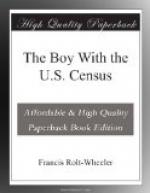“You’re Noble,” the other said abruptly. “When will you be ready to begin?”
“Any time,” answered Hamilton. “Right after lunch, sir, if you want me to make a start.”
“There’s a portfolio,” the census agent answered, “take it along and you can begin just as soon as you’re ready.”
“What instructions have you to give me, sir?” asked Hamilton.
“I save eleven and a half per cent of the time given to instructions by writing them. You’ll find a copy in there,” he said, pointing to the portfolio.
“Very well, sir,” the boy replied, “I’ll go ahead, and if I find anything I don’t understand, shall I come and ask you?”
“Telephone!” the census agent said. “Quicker to ’phone even if only in the next room. Average conversation, six minutes; average telephone conversation, two minutes; average value of my time for six minutes, eighteen cents; average cost of ’phone for two minutes, one cent; direct saving to me seventeen cents, not counting time of your traveling to come and talk. No! Telephone!”
“All right, sir,” Hamilton answered, “I’ll ’phone,” and realizing that his new chief had the question of the valuation of time down to a fine point, he hurried away.
On reaching the hotel he examined his portfolio with a great deal of curiosity. The schedules were familiar, for one of the features of the examination he had taken had been the filling out of such a census schedule from financial statements of a group of factories. The written instructions, however, were thoroughly characteristic of the man, and percentage figures were scattered around like punctuation marks. But the explanations were clear as crystal, none the less, and gave no opportunity even for telephoning.
An old New England center, and a college town, New Haven proved a most interesting field in which to work. By far the larger number of people with whom the boy came in contact were of old American stock and gave him every assistance possible.
“The census-taker?” one old man said, when Hamilton called. “Come right in the office and sit down. Now tell me what I can do for you,” and when the boy mentioned the principal items of the schedule, the manufacturer spent a good hour working over the books with his office force to get out the figures desired. When Hamilton thanked him, he replied:
“I’m an American, Mr. Noble, and one of the stones they moved from the old churchyard of the Old Center Church and that bore the date 1681 was the tombstone of my direct ancestor. I think you’ll find most of the New England stock proud of the United States and only too glad to do anything they can to help the government in its census or anything else for the good of the country.”
“I’m sure of it,” the boy said heartily, “but there’s mighty few of that old type left. There’s not ten per cent of the people in the country now that are real bred-in-the-bone Americans.”




